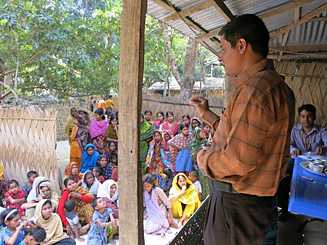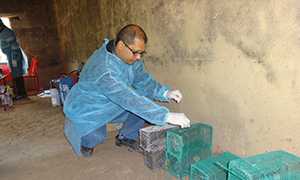Global Disease Detection Program: Bangladesh

Conducting community education to raise awareness of the dangers of drinking raw date palm sap, which is associated with Nipah virus transmission.
The Centers for Disease Control and Prevention (CDC) has been collaborating with International Centre for Diarrheal Disease Research (ICDDR,B) in Bangladesh for over 40 years. In 2011, CDC furthered this partnership through the establishment of a Global Disease Detection (GDD) Center. This partnership works to strengthen the country’s capacity to detect emerging infectious diseases, provide technical assistance for outbreak response, and provide training to other partners in Bangladesh.
The Center frequently collaborates with multiple international and national organizations to enhance global health security in the country. CDC and ICDDR,B jointly support outbreak investigations and response by providing technical advice and scientific leadership, in addition to supporting surveillance activities for infectious disease in hospitals and for avian influenza in live bird markets. This partnership remains crucial in providing early warning for international outbreaks.
The GDD Center in Bangladesh helps contain outbreaks close to the source by building up local resources, drawing on combined expertise in:
- Emerging infectious disease detection and response
- Field epidemiology and laboratory training
- Pandemic influenza preparedness and response
- Laboratory systems and biosafety
- Zoonotic disease research and control
Making an Impact

From 2011-2016, the GDD Center in Bangladesh supported:
- Effective response to 136 outbreaks, including Middle East Respiratory Syndrome Coronavirus, anthrax, influenza A (H5N1), and Nipah virus
- Detection and identification of three novel strains and pathogens, including two new to the region, and one new mode of transmission
- Establishment of two levels of the Field Epidemiology Training Program
- Training of over 7,953 public health officials in short-term public health exercises, including epidemiology and laboratory, rapid response, and risk communication
- Publication of over 124 peer-reviewed scientific articles
- Page last reviewed: October 16, 2017
- Page last updated: October 16, 2017
- Content source:


 ShareCompartir
ShareCompartir